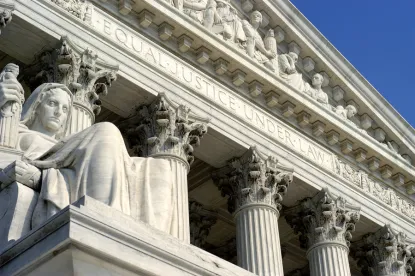Yesterday, the U.S. Supreme Court fundamentally changed the landscape for where patent infringement lawsuits may be filed. The Court ruled that under the patent venue statute, a corporate defendant “resides” only where that defendant is incorporated. Reversing a long-standing Federal Circuit Court of Appeals rule permitting patent infringement suits to be filed wherever personal jurisdiction over the defendants exists, the Court’s decision in TC Heartland LLC v. Kraft Food Brands Group LLC, No. 16-341, substantially limits the venues where patent infringement suits may be filed.
The patent venue statute, 28 U.S.C. § 1400(b), permits a patent infringement action to be brought "in the judicial district where the defendant resides or where the defendant has committed acts of infringement and has a regular and established place of business" (emphasis added). In 1957, in Fourco Glass Co. v. Transmirra Products Corp., the U.S. Supreme Court held that § 1400(b) was exclusive and that a corporate defendant "resides" only where it is incorporated. More recently, in VE Holding Corp. v. Johnson Gas Appliance Co., 917 F.2d 1574 (1990), the Federal Circuit held that the general venue statute, 28 U.S.C. § 1391, provided venue anywhere that a plaintiff could establish personal jurisdiction over the defendant. This Federal Circuit ruling led to a proliferation of patent infringement lawsuits in a very few jurisdictions with plaintiff-friendly reputations, particularly the U.S. District Court for the Eastern District of Texas.
Yesterday, in an 8-0 decision authored by Justice Clarence Thomas, the Supreme Court rejected the Federal Circuit's approach and held that the exclusive basis for venue in patent infringement suits is under the patent venue statute and that a defendant “resides” only in its state of incorporation. This decision greatly reduces venue options for bringing patent infringement suits against corporate defendants. In the aftermath of this decision, there will be a shift away from filing patent lawsuits in the Eastern District of Texas (along with transfers of pending lawsuits) to federal courts in other states.
According to the amicus brief filed on behalf of professors from Stanford Law, 44 percent of all patent suits filed in 2015 were filed in the Eastern District of Texas. Over 90 percent of those cases are brought by “patent trolls,” or companies that hold patents for the purpose of litigating patent suits, but do not manufacture or produce products practicing the inventions. Additionally, the Stanford Law professors estimated that 86 percent of patent cases filed in 2015 were filed somewhere other than the defendant’s primary place of business. In light of the Supreme Court’s decision yesterday, litigation will shift to defendants’ home jurisdictions. We will likely see an uptick in Delaware, where a larger number of businesses are incorporated, as well as areas where technology businesses are concentrated, like California. The decision will be met with open arms by major players in the technology industry. Dell, Oracle, Intel and Adobe all filed amicus briefs in support of this interpretation.
That said, while this holding greatly reduces venue options, it does not limit jurisdiction entirely. The statute actually permits filing (1) “where the defendant resides,” or (2) “where the defendant has committed acts of infringement and has a regular and established place of business.” The Supreme Court’s decision pertains only to the first prong of this statutory provision concerning residence.
In light of the limitation of a defendant’s residence, plaintiffs will likely research to identify the friendliest jurisdiction where the defendant has a “regular and established place of business” and arguably infringed. Based on decisions issued before this second test was rendered superfluous in VE Holding, a defendant has a “regular and established place of business” where a defendant’s presence in the jurisdiction is “permanent and continuous” and is related to the alleged infringing acts. A defendant need not have a physical office in the jurisdiction, but the defendant’s presence cannot be temporary. Legislation introduced in 2016 proposed further limitations on what constitutes a “regular and established place of business,” but the legislation stalled in Congress. The Supreme Court’s decision yesterday may renew interest in Congress in revising this provision of § 1400(b).
The Supreme Court also expressly refused to address the effect of its decision on foreign entities with no established “place of business” in the United States. Thus, the rules for venue in cases against foreign entities will remain unchanged (i.e., they will remain subject to jurisdiction in any district).
In summary, the Supreme Court’s decision in TC Heartland LLC v. Kraft Food Brands Group LLC marks a major change for venue in filing patent infringement lawsuits and likely eliminates the use of the Eastern District of Texas as a default.





 />i
/>i
